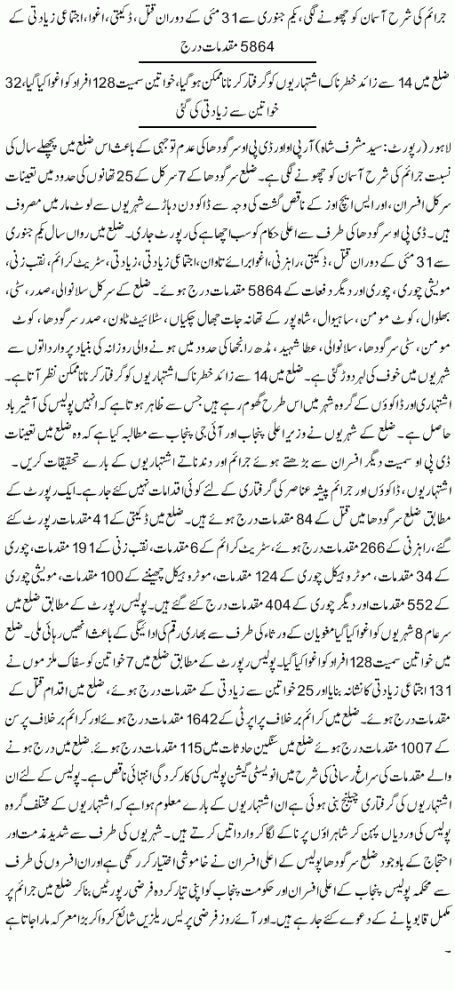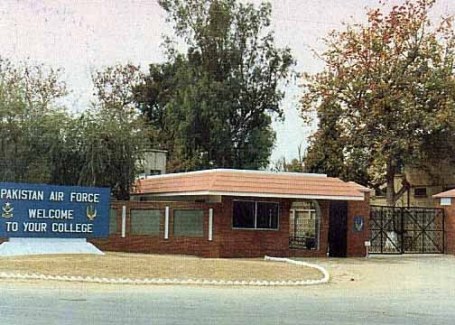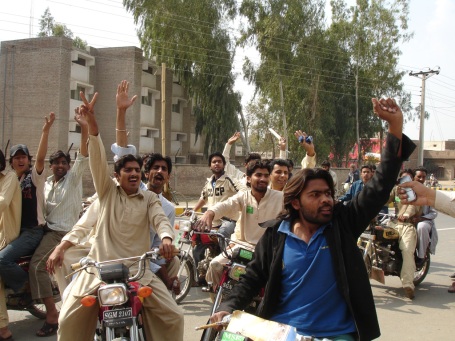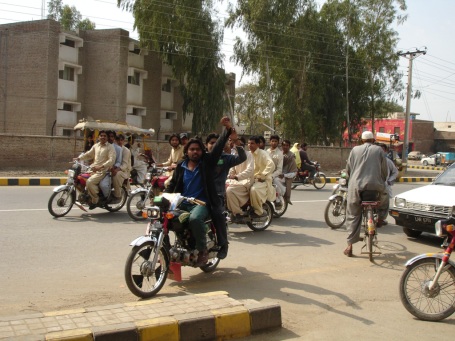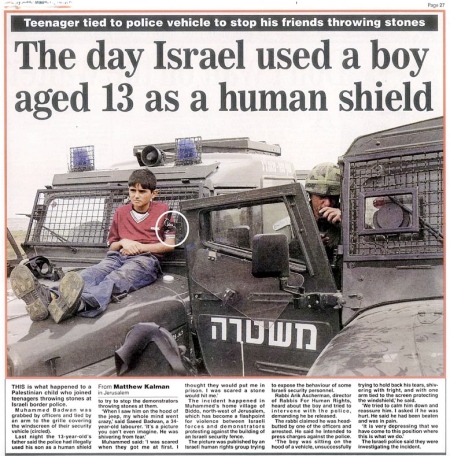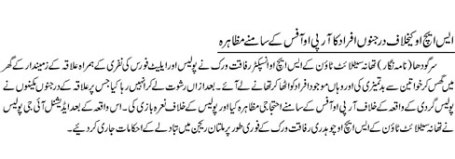ZARDARI’S PRESIDENCY — Challenges and Expectations
Mr. Asif Ali Zardari, we believe, was not fit for presidency due to various reasons, and that is why the Jamaat e Islami members in the Senate thought it proper to vote instead for Justice Saeed uz Zaman Siddiqui. Nevertheless, when the electoral college elected him as majority president, we accepted its verdict with an open heart, and formally congratulated him on his success. We also promised him our support in case he acted within the constitutional limits and fulfilled his commitments made to the people from the Pakistan Peoples Party’s platform, especially in regard to the reinstatement of the judges unlawfully retired, the revival of the 1973 constitution as on October 12, 1999, as agreed between the PPP and the Pakistan Muslim League (N) under the Charter of Democracy, in May 2006.
With Pervez Musharraf’s resignation and Zardari’s take over, the Parliament was completed in accordance with the February 18 elections, and the country resumed its journey towards democracy, and from one-man rule towards the rule of law and the Constitution. The present situation in fact is a trial period for the new government, particularly the PPP and its leadership, the Parliament and the provincial assemblies, as to how quickly they free the nation from the style and the traditions of the 9- year’ dictatorial rule, and move ahead towards making the country a true Islamic, parliamentary, federal and welfare state in line with the Constitution of the Islamic Republic of Pakistan. This is indeed a historic moment and here lies the PPP’s real test.
At this juncture, we feel it necessary to list the challenges facing the country for the benefit of the PPP leadership, along with the nation’s expectations from the new government, as we think that the total responsibility lies on PPP which enjoys full power at the centre and in three provinces, and which got its candidates elected as president, prime minister, NA speaker, deputy speaker, provincial governors, besides chief ministers of two provinces according to its sweet will, and which has assumed responsibilities over and above its parliamentary position. It is a coalition only in name, as the real power lies with the PPP and the coalition partners too have assigned decisive role to the majority party.
Three Basic Facts
An analysis of the February 18 elections highlights three things that should be kept in mind. First, the electorate completely rejected Pervez Musharraf and his political partners; the logical outcome of which had been to relieve him from authority forthwith along with his entire team. In these elections, the masses also gave a clear verdict on the armed forces’ role in politics, and the new military leadership appears to have accepted this verdict by showing willingness to work under the civil authority and by announcing that it has no political ambitions.
Secondly, the electorate has rejected not only Pervez Musharraf but also his policies. This public mandate, also supported by public opinion surveys during this period, clearly warrants a democratic set up in place of dictatorship, and the rule of the constitution and the law, against dictatorship. As for foreign policy and the so called “war against terror”, the public mandate calls for giving up the American line and adopting an independent policy based on our national interest. Similarly, the masses want new policies on Kashmir, regarding the ideological identity of our country and its role, as also in the economic and financial field, in place of Musharraf’s policies. Thus, the new policies should be in line with the aspirations of our people and our real national requirements, and should be instrumental in the realization of our national objectives and protect the national interests. The public mandate was for change in the policies, not for their continuation.
Thirdly, as important aspect of the election result is that the people did not vote for a single party rule. The Peoples Party no doubt emerged as the largest party but it has secured only 30 per cent of the total votes, and hardly 33 per cent of the NA seats. The spirit of the public mandate therefore demands that the PPP should adopt the policy of power sharing instead of monopolizing power, and it should give foremost attention to such common goals and targets as were of central importance in the manifestoes of the two major parties and their commitments to the masses.
CHALLENGES
The biggest challenge before the government is the Charter of Democracy. The basic points agreed upon in this Charter include:
1. The revival of the Constitution as on 12th of October 1999, the most important point being the revival
of the parliamentary system in its true form and the supremacy of the parliament, transfer of the
powers taken away by the president, to the prime minister, annulment of the section 58 (2),b, and the
powers to appoint the armed forces chiefs and provincial governors.
2. Complete independence of the judiciary, and evolving a transparent system for the appointments and
the removal of the judges.
3. Respect for one another, within the framework of the constitution under the formula of “ live and let
live,” along with a resolve not to side with a military dictator in future.
4. Ending the politics of revenge, and evolving a strong system of accountability that is impartial, reliable
and transparent.
5. Establishment of an independent Election Commission.
6. Removal of the two terms restriction for the prime minister and the chief ministers.
7. Thorough enquiry into the Kargil tragedy through an independent commission,
8. Abolishing the National Security Council and revival of the Cabinet Defence Committee.
Apart from the above eight points, five other issues listed in the Charter of Democracy assumed much
importance, later followed by the expression of a national consensus in the London Declaration of July
2007 and the Muree Declaration in March 2008. These are:
1. Condemnation of the November 3, 2007 unconstitutional and unlawful action and annulment of all
these, especially the reinstatement of the deposed judges of the Supreme Court and the High Courts,
on the position of November 3,2007.
2. Need for adopting effective and urgent measures to overcome the economic and energy crisis created
by the previous rulers, and provision of adequate relief to the masses.
3. Proper planning to overcome the disastrous effects of America’s “ war against terror” aggravated by
Pervez Musharraf’s role in that, along with efforts to seek political solution of the issue through
dialogue instead of force keeping in view the supreme national interests.
4. Immediate end of military operation in Baluchistan and other parts of the country. Finding out political
solution of the political problems, along with sincere efforts to remove the deprivations of the
provinces, formulation of a unanimous strategy and devising an action plan for this purpose, and .
5. Making amends for the damage done to Pakistan’s principled stance on Kashmir issue because of the
U-turns taken by Pervez Musharraf, and expression of complete solidarity with the Muslims of Jammu
and Kashmir in their ongoing resistance against occupation troops.
These five points are in fact different aspects of the real challenge and the performance of the PPP and the Zardari government will be measured in the efforts it makes to resolve these issues. The nation, however, expects the government to give up the policy of lip service, propaganda and slogan mongering, evolve a national consensus on these, and devote all its energies to achieve positive results in these directions.
PPP GOVT’S PERFORMANCE
The performance of the PPP government headed by Mr. Zardari during the last six months has been disappointing. Some of its important failings are:
1. The continuation of the coalition government seemed to be doubtful from the very beginning due to the
clear contradictions between the words and deeds of the coalition partners on the basic points, and this
proved to be true with the PML(N)’s withdrawal from the government on the judges’ reinstatement
issue.
2. Zardari’s casual attitude in regard to agreements, and his assertion that political agreements are not
sacred and can be revoked any moment, is a moral crime, which has reduced entire politics to a
plaything and the political discourse unreliable.
3. The PPP, especially Zardari’s attitude during the last six months shows the “continuation” of the
policies, instead of a “ change” which is contrary to the February 18 mandate. The way the
government complicated the judges issue has lowered the dignity of the courts, and its attitude
towards the judiciary has not been different from that of Musharraf. Whereas Musharraf had attacked
the judiciary from outside, Zardari’s special advisor and law minister assailed the institution from
within, accomplishing what remained to be done.
4. Undoubtedly, the PPP government inherited the economic and the energy crisis, yet it has failed to
frame an effective and concrete policy during the last six months, as it doesn’t seem to have a grip on
the situation. The situation appears to be similar to what the poet has said:
“ Nay hath ba’g par hay no pa’ hay raka’b mayn”
“Neither ( he) has the reign in his hands nor are ( his) feet in the stirrup.”
This continuation of the policies has a multiplier effect on people’s lives, especially in the important
sectors of agriculture and industry.
5. During these six months, the military operation already going on in Baluchistan, Waziristan, Bajaur and
Swat has been intensified, and the promises for finding out a political solution to the problem have
remained unfulfilled. On the one hand, the Pakistan army has been raining bullets on its own
countrymen, while on the other, the U.S. continues to violate our geographical boundaries with a
greater ease, killing our citizens in the name of miscreants. Ironically, during the three years of
Musharraf rule from 2004 to 2007, U.S. border violations had been 34 times, whereas during the six
months of the PPP rule, there were 23 violations. U.S.’s attack on September 3 last was almost a
declaration of war. Its helicopters dropped troops on the Pakistan border who massacred the Pakistani
women and children freely, and then returned with full ease. According to a New York Times report,
this attack was in line with President Bush’s policy of Direct Action in Pakistan Territory. Paradoxically,
this attack was made exactly at the time when in Islamabad, the U.S. Admiral Mollen was giving
assurance to Prime Minister Gilani that Pakistan’s sovereignty would be fully respected. In this “ show
of respect”, the pilot-less American drone killed seven innocent citizens..
In this background, Mr. Zardari had assumed the high office of the president. Interestingly, a few days earlier, prime minister Gilani and even President Zardari, had made statements that the new president would be neutral and a symbol of the federation.
HOW TO OVERCOME THE CRISIS
While making Zardari realize the gravity of the situation, we would request that if he earnestly desired to serve the country and wished to steer the homeland out of the prevailing crisis, he should
adopt the following measures to build up hopes for the future:
1. First, he should announce that all pacts or agreements made, especially in political and state matters,
would be fulfilled. The affairs of life can be smoothly run only on the basis of trust which demands
fulfillment of covenants and agreements.
2. He has been talking a lot about politics of mutual understanding, but some of his initial steps speak of
glaring breach of trust with coalition partner, ending up in their parting of ways. The political mess
being created with the appointment of a PPP stalwart as Punjab governor is likely to kill the politics of “
live and let live”, and lead to the politics of confrontation which would be disastrous for the country as
also for those in power. Such a policy must be abandoned. Every state functionary should remain
within the limits of the law and the constitution, and the rights of the others should be fully respected.
3. It would be proper for him to dissociate himself from the PPP’s political and organizational affairs to
keep the office of the president above party politics. This warrants his immediate resignation from the
party co-chairmanship.
4. His taking over as president also calls for his clarification on two points relating to his person. We do
believe in the privacy of an individual and respect his private and personal affairs, but the holders of a
public office has to account for his personal conduct as well. Therefore, it is essential that he doesn’t
take shelter under the notorious N.R.O. to prove his innocence. Instead, he should come forward and
remove all doubts against him in the minds of the people within the country and abroad, through a
mechanism in line with the Charter of Democracy.
TWO MISGIVINGS
One of these relates to the medical reports he had been sending to the court through his panel of counsels for his non appearance. These are now public property after their publication in the Financial Times, England. There are only two possibilities in this respect. If these reports are correct, the public has the right to know under the constitution, if he has got rid of the ailments he suffered from during that period for the obvious reasons that that the individual who suffers from this ailment stands disqualified from holding a key post. If on the other hand, these reports are incorrect and were sent to the court only to seek exemption from appearance, it amounts to making a false statement before the court which is perjury, a serious crime in the eyes of politics and the law both. Under the American constitution, the President can be removed only on account of perjury.
This should not be dismissed as a journalistic scoop, as it may have serious constitutional, legal, political and moral repercussions which should not be ignored by him. Secondly, there are allegations of financial corruption, money laundering and misuse of official authority. True that these charges have not been proved in any law court, but the fact remains that these allegations are not totally unfounded, and the Swiss judge holding his trial saw much substance in the charges and he was disappointed on the withdrawal of the case. After the availability of the details on the internet, it is his moral duty to his innocence. Complete information about the number of times he and his panel of counsels had sought adjournment, is available on the internet, and establish the fact that both the petitioner and the respondent abused the court process to serve their vested interest.
TWO CONCRETE CHARGES
Apart from these, two other issues call for immediate explanation. What was the source of sixty million dollars in the Swiss Bank that has now been released by the government, Zardari being the sole beneficiary? The said amount estabishses the fact that he did not mention this amount in his statement of assets when he took oath as MNA and Senator. He owes an explanation to the nation about the source of this big amount as his rightful possession. Secondly, there is the Surrey Palace issue that he had denied in the past as his property. Benazir Bhutto too had dissociated herself and her family from this palace in a statement made on the floor of the National Assembly. In spite of that, he has claimed the amount secured from the Surrey Palace auction. If his claim is valid, what was the position of his earlier statement and the declaration made by his wife?
However, it is the future that is more important than the past. The president’s office is a sensitive one. The American president too is required to declare his assets at the time of assuming office, and during his tenure, he is not permitted to look after his personal business or any income generating concern. Instead, all his wealth is placed under Wardship. Therefore, a respectable way for Zardari too would be to declare all his assets, explain the source of his undeclared wealth and also inform the nation the amount of tax he had paid on that. Next, he should dissociate himself completely from his personal or family business till the end of his term. As long as such a tradition is not set in the national politics, corruption cannot be uprooted from the country.
PUBLIC OPINION
Zardari should be bold enough to face this situation as doubts prevail in the public mind on a large scale within the country as well as abroad. This is essential to protect his dignity and that of the country. An analysis of the articles and editorials published during this period world wide shows that 90 per cent of these have raised these issues. Therefore, the matter cannot be wound up simply by saying that everything has been cleared under the National Reconciliation Ordinance (NRO). We are reproducing only two articles published by the TIME magazine and the ECONOMIST, to support the view that it is not” a dead and closed issue” as stated by Farooq A. Naik. On the other hand, it is “ an alive and under discussion issue”, that would have to be faced. Hiis personal integrity as well as the national interest demands that.
The Time writes:
Zardari’s rise to Pakistan’s Presidency reads like a Cinderella tale turned Mafia thriller….Zardari always had a reputation for wheeling and dealing. When he was Investment Minister during Bhutto’s second term, his alleged involvement in kickback scandals earned him the sobriquet “Mr. 10%”…… Sharif, and Musharraf pursued money-laundering and corruption cases against Zardari in Britain, Spain and Switzerland. All charges were dropped last fall after a controversial amnesty deal brokered by Musharraf. Zardari maintains that the charges were politically motivated. Yet unease over his credibility lingers. …..Zardari [will have] to overcome suspicions about his past. (The Time, “Pakistan in Crisis”, September 22, 2008).
The ECONOMIST wrote the following editorial note on Mr. Zardari’s taking over as President:
Three clouds hovered over Asif Zardari as he was sworn in on september 9th as Pakistan’s President. The economy is in crisis. Second, the war against the local Taliban is going badly. And, third, Mr. Zardari himself has not shaken off the reputation he earned when his late wife, Benazir Bhutto, was prime minister, as “Mr 10%”. ___ a man less interested in running his country wisely than in looting it greedily”. (The Economist, September 13, 2008)
It is really painful for us to reproduce these things, but the dignity of the high office Zardari holds demands that all these matters be cleared. Political vendetta no doubt is a serious crime and implicating someone in a crime prior to his being proved guilty is equally wrong. Nevertheless, if the allegations are the talk of the town and are being leveled so continuously, and the whole thing is wound up as a result of a political settlement without being vindicated through an open judicial process, it would be a redemption opposed to justice. Such a measure cannot help regain ones lost name. The accountability of a public personality and administration of justice are essential, fleeing from which cannot help improve one’s image.
A true Muslim is careful enough not to provide anybody an opportunity to level an allegation against him. It is in this spirit that we express our hope that along with resolving political and policy matters, the revival and the strengthening of the institutions and while framing correct policies on all internal and foreign issues, Mr. Zardari will also feel his responsibility to clear all the doubts concerning his private life. Whoever adopts the path of public life, must also prove his integrity and personal loyalty.
Sir Roy Jenkins in his famous book, CABINET GOVERNMENT, writes
(It is not necessary for a minister to be master of all trades, yet the most important quality required of him is character and integrity. With this, the nation can fully trust in his leadership, and the lack of knowledge and expertise can be overcome through consultation and cooperation. But in case of immature character and with zero or doubtful integrity, proper governance becomes difficult.)
May we hope that with his oath taking as president, the nation would be dealing with a different Asif Ali Zardari from the one known in the past, who would be facing the challenges ahead with the reputation of a noble man. We pray to Allah to deliver the nation and the country from the types of Ayub, Yahya, Zia and Musharraf, and for the revival of the model set by the Father of the Nation, Quaid-i- Azam Muhammad Ali Jinnah.
December 23, 2008 at 3:22 pm

website of sargodha
About Sargodha
Sargodha ,is a city located in Punjab province, Pakistan. It is located in northeast Pakistan, to the north-west of Lahore by the lower Jhelum Canal. It is 10th largest city of Pakistan. It is an agricultural trade centre with varied industries.[Sargodha is one of three “planned cities” in Pakistan (the other two are Faisalabad and Islamabad .
Sargodha Air Base hosts the Headquarters of the Central Air Command, one of three combatant air commands on the Pakistani Air Force. Aircraft currently based at this facility include two squadrons of General Dynamics F-16A fighters. The base is also the site of the Pakistan Air Force Combat Commander School. This fighter tactics and weapons school is the Pakistani equivalent of the American “Topgun” school at US Naval Air Station Miramar in California.
History of Sargodha
There are several theories as to the origins of the name. It may be derived from the Sanskrit Svargadhama, meaning Heavenly Abode although this would have resulted in Punjabi Sargdham. Sargodha may be derived from a legend about a pond where an old Hindu Sadhu Godha used to live, as the Punjabi word for pond is Sar: Sargodha might translate to “the pool of Godha”. However, Punjabi would reverse the order of the component words (for example, Amritsar means “the pool of nectar.” The etymology must lie in Sar + Godha, with Sar being the adjective and Godha the noun.
Just over a century ago, there was a well owned by a Hindu, Godha, which was known as Gol Khuh, Punjabi for Round Well, and travelers used it as a resting place. The well eventually went out of use; now, there is a market where Gol Khuh was and a grand mosque above the market and it is known as “Gol Chowk”, which is the centre of downtown Sargodha today
Sargodha was a small town at the beginning of the British Raj but, due to its geographical location, the British Royal Air Force built an airport there. It took on greater importance after the Partition of India for the Pakistan Air Force
Shahpur, which is now a tehsil of Sargodh District, was the district at that time. Most parts of the tehsil Sillanwali and Kirana Pahari region were part of Jhang district and were included later during the British Raj in the Sargodha district
1965 Pakistan India War
The Indo-Pakistani War of 1965 started on September 6, 1965 and Sargodha was on its front line. The Citizens of Sargodha supported the Pakistan Army against the advancing and numerically larger Indian Army. In 1966, recognising this bravery, the Government of Pakistan awarded the citizens of Lahore, Sialkot, and Sargodha the award of Hilal-E-Istaqlal.
PAF Base
PAF Base Sargodha is now known as PAF Base Mushaf, named after the late Air Chief Marshal Mushaf Ali Mir (March 5, 1947 – February 20, 2003), the former Chief of Air Staff of the Pakistan Air Force from November 20, 2000 until his death when his PAF Fokker F-27 crashed near Kohat, North-West Frontier Province. He had been posted in Sargodha as the Base Commander.
Demographics and Location
Sargodha is the 10th largest city of Pakistan. It is located 172 kilometres northwest of Lahore, in Sargodha District. It lies about 30 miles from the M2 Motorway which connects Lahore and Islamabad. it is connected to motorway M2 by several interchanges at different locations.
It is an agricultural city with citrus, wheat, rice, and suga cane being its main crops.
Administration
Until divisions were abolished in the year 2000, Sargodha was also divisional headquarters of Sargodha Division, currently Sargodha is the district and tehsil capital – the city of Sargodha is administratively subdivided into 22 Union Councils
Languages
Punjabi is the main language of the people. The dialect of Punjabi spoken in Sargodha is the Shahpuri dialect. Urdu and Siraiki are also widely spoken
Education
Sargodha is famous for quality education, PAF public school, ABICS, and lot of other colleges for basic education are at their class. A public sector university was established in 2002. University of Sargodha has a very good repute in a very short time for higher education authorities. A lot of other private and public sector institutions are serving the job very well
Media
• Dhoom News TV Channel Sargodha (Bureau Office) Upper Story NADARA Office, Khayyam Chowk Sargodha. Bureau Chief: Raja Asif Mahmood Audio-Visual Editor: Ghulam Muhammad Malik
• Royal News TV Channel Sargodha (Bureau Office) Upper Story NADARA Office, Khayyam Chowk Sargodha. Bureau Chief: Amjad Ali Audio-Visual Editor: Ghulam Muhammad Malik
• Radio Pakistan Sargodha (FM Band),Club Road Sargodha.
• FM Sunrise (96 MHz) Most popular, also plays Indian and western music, Aziz Bhatti Town Sargodha
• Pakistan Television Islamabad centre terrestrial transmissions at VHF and UHF band routed from Sakesar rebroadcast centre.
Website of Sargodha city
http://www.sargodhanews.com
Major Industry
Electrical Fittings Industry is the major industry of Sargodha. Almost 70% of Pakistan’s Electrical Fitting products are being produced in Sargodha
Citrus fruit
Sargodha is a large producer of citrus fruit, Kinnu (a type of orange), Malta, musammi, and grapefruit, as the climate is suitable for these fruits. Much of the fruit is sold domestically
Shopping in Sargodha
In the past, shopping in Sargodha was limited to the Katchery bazaar but as the city developed shopping centres like al Rehman Trade Center, Shaheen shopping mall spread all around the city.

website of sargodha city
November 15, 2008 at 2:00 pm
